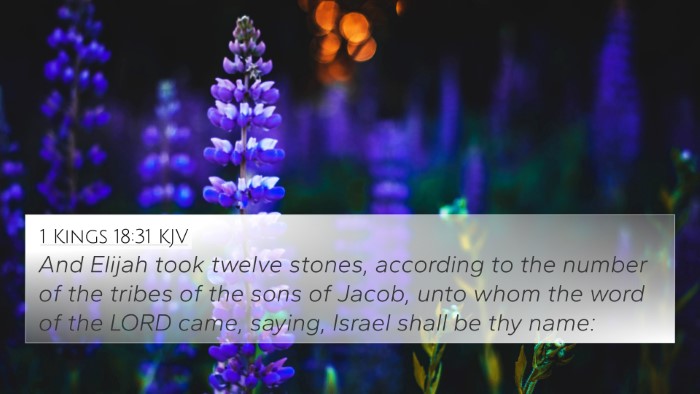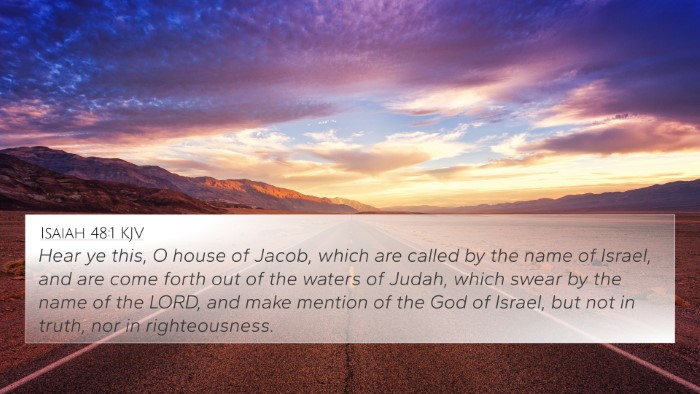Understanding 2 Kings 17:34
2 Kings 17:34 states:
“To this day they do after the former manners: they fear not the LORD, neither do they after their statutes, or after their ordinances, or after the law and commandment which the LORD commanded the children of Jacob, whom he named Israel.”
This verse captures a significant moment in the historical narrative of Israel, particularly focusing on the consequences of disobedience and the ongoing patterns of behavior among the people.
Summary of Commentary Insights
The insights from public domain commentaries such as those by Matthew Henry, Albert Barnes, and Adam Clarke provide a deeper understanding of this verse, highlighting key themes and the significance of the behaviors described. Below is a synthesized analysis based on their interpretations.
-
Historical Context:
2 Kings 17:34 can be understood within the broader context of Israelite history, particularly the fall of the Northern Kingdom and their subsequent practices. Matthew Henry emphasizes that the people of Israel had a tendency to revert back to their pagan customs despite knowing God's commandments.
-
Rebellion Against God:
The repeated phrase "To this day" suggests a long-standing and unrepentant attitude among the people of Israel. Albert Barnes remarks on this continued rebellion, pointing out that they "fear not the LORD," indicating a lack of reverence and obedience to God.
-
Spiritual Consequences:
Both Clarke and Henry note that disobedience led to spiritual decay, where the people disregarded God's statutes and ordinances. This sentiment illustrates the theological principle that communal disobedience invites negative consequences for a nation as a whole.
-
Failure to Learn:
The verse's mention of "the former manners" suggests an unwillingness to learn from history. Their failure to abide by God's laws demonstrates a persistent cycle of sin, which both Clarke and Barnes connect to the broader narrative of Israel's apostasy.
-
Identity and Name:
The reference to “the children of Jacob, whom he named Israel” serves as a reminder of their identity. According to Barnes, it highlights the covenant relationship that Israel had with God, emphasizing how far they had strayed from their divine calling.
-
Lessons for Today:
Contemporary application suggests that believers should learn from the mistakes of Israel. The lack of reverence toward God can lead to a disconnect from His will. This applies to individuals and communities in our time as they navigate their faith in a secular world.
Cross-References for Further Study
The study of 2 Kings 17:34 can be enriched by exploring various related Bible verses. Here are some key cross-references:
- Exodus 20:1-6: Discuss the commandments given to Israel, highlighting the consequences of idolatry.
- Jeremiah 2:19: Illustrates the consequences of forsaking the Lord.
- Hosea 4:6: Addresses the issue of knowledge and the consequences of rejection of God’s teachings.
- Micah 6:16: Reflects on Israel's failures to keep God's statutes.
- Romans 11:22: Explains the consequence of disobedience as a warning to the Gentiles.
- Hebrews 2:1-3: Warns about neglecting salvation and the importance of adhering to the message of Christ.
- James 4:4: Highlights the enmity between the world and God, relevant to the spiritual condition of Israel.
Thematic Connections to Other Scriptures
The themes in 2 Kings 17:34 resonate with various biblical principles, forming a web of connections between different texts:
-
Faithfulness vs. Apostasy:
The narratives of faithfulness in the face of trials (e.g., Daniel 3:16-18) contrast sharply with the apostasy depicted in 2 Kings.
-
God’s Sovereignty:
God’s ongoing authority over His people as displayed in verses like Psalm 82:8 reflects the hope of restoration even amid rebellion.
-
Repentance and Restoration:
2 Chronicles 7:14 reminds believers of the promise of healing and restoration if they turn from their wicked ways.
-
Idolatry:
1 John 5:21 cautions against idolatry, which echoes the concerns present in the historical accounts of Israel.
Conclusion
In conclusion, 2 Kings 17:34 serves as a pivotal reminder of the consequences of disobedience against God’s commandments. By using tools for Bible cross-referencing, readers can uncover profound connections and thematic analyses that enrich their understanding of scripture. In a world that often mirrors Israel's ancient patterns, this verse challenges believers to consistently align with God's will and teachings. Utilizing comprehensive Bible cross-reference materials can help deepen one's faith journey by connecting disparate scriptures into a cohesive understanding and application of God’s word.












